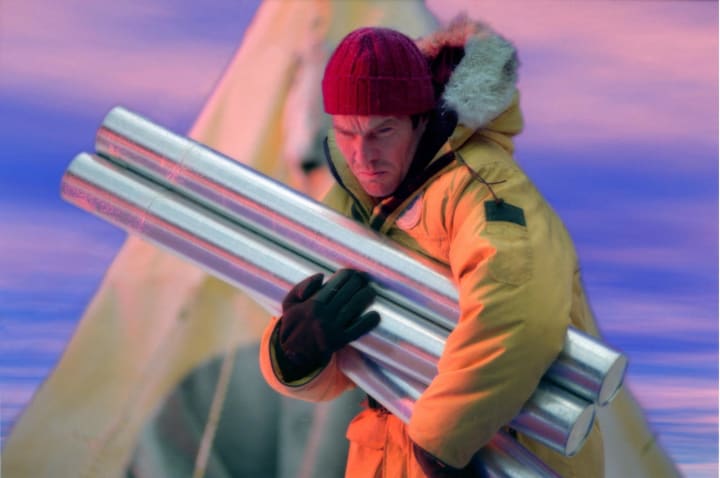Revisiting 'The Day After Tomorrow'
The climate change disaster epic turns 15 in 2019.

2019 marks the fifteenth anniversary of the release of The Day After Tomorrow. Co-written and directed by Rolland Emmerich in the midst of his being the modern "master of disaster," it was a sizable hit in cinemas and a TV re-run staple. How well has it aged though?
One thing that the film has going for it, as does so many of Emmerich's films, is its cast. Dennis Quaid's casting as paleoclimatologist Jack Hall is something of a foundation for the entire film, with Quaid bringing both an everyman quality to the role as well as a sense of intelligence necessary to make him believable as a scientist. The other significant bit of casting is Jake Gyllenhaal, who is just about believable as Hall's teenage Sam that becomes the audience's main in-road to the incredible weather events taking place in the plot. That Gyllenhaal has strong chemistry with his co-stars closer to being the actual age of their characters helps while the handful of scenes early in the film between father and son, helping establish their relationship as potentially loving but slightly estranged. It's something that, while invoking cliches perhaps at times, helps anchor the film all the same.

Father & Scientist: Dennis Quaid as Professor Jack Hall in a scene early in the film.
It also helps that the rest of the cast is solid. A young Emmy Rossum shines as academic decathlon contestant Laura who becomes a love interest for Sam in the New York portions of the narrative. Though not a sizable role, Sela Ward does well in her brief appearances Dr. Lucy Hall, Jack's ex-wife and Sam's mom, is trying to care for patients. It's also a cast nicely filled with veteran character actors such as Ian Holm in a delightful role as a fellow climate scientist, Kenneth Welsh as the Dick Cheney like Vice President, Dash Mihok as Hall's aide Jason, and the ever reliable Jay O. Sanders as Hall's longtime colleague Frank Harris. They're just the tip of a strong cast, something which even in recent turkeys like White House Down and the Independence Day sequel Emmerich has been good at putting together.
It is also, perhaps not surprisingly, a special effect feast. From the still impressive all CGI opening credit sequence to tornados in Los Angeles, a tsunami striking Manhattan, and British Royal Air Force helicopters frozen out of the sky, it is everything that one might ask from an Emmerich film. It's also well-realized, with much of the CGI holding up after all this time with the singular exception of a pack of wolves who even by the standards of the time look unconvincing. Combined with the sound design and music of composer Harald Kloser, the results are still incredible to watch. Of all of Emmerich's films, it is perhaps only second to Independence Day in how well its effects hold up.

Before disaster: Jake Gyllenhaal with Emmy Rossum and Arjay Smith in a still from the film.
Where the film suffers, as does so much of the director's work, is in its script. There are more than a few cliches and thin characterizations at play in the film's two-hour running time which are grating at times. More often than not, especially with the Sam and Laura relationship, the film is saved from going too far by the sheer chemistry of the cast. Well, that and well-timed uses of humor to boot. Just how right and wrong the film gets its science too is interesting, and has, of course, been discussed far better than I can hope to do so here. Needless to say, as someone who has read the film's non-fiction source material (The Coming Global Superstorm by Art Bell and Whitley Strieber), it's hard not to find the ideas compelling, even if the timetable undergoes sizable, if not implausible, acceleration.
Despite some of those issues, The Day After Tomorrow is a film that, even after 15 years, still plays to all of the director's strengths. It's a bold, epic that takes in a large cast of characters and a worldwide scope. Despite that scope, it's principally focused on the United States with glimpses of what is happening elsewhere. It's a tale of survival told in as un-sensational a style as it can. In short: It's The War of the Worlds of the climate change era, doing for it what HG Wells did for alien invasions.
Plus, as I write this, it's hard not to find the scenes of Americans fleeing into Mexico funny. Heaven forbid if something like what the film portrays actually happens. In that regard, at least, it could well be The Day After Tomorrow...
About the Creator
Matthew Kresal
Matthew Kresal was born and raised in North Alabama though he never developed a Southern accent. His essays have been featured in numerous books and his first novel Our Man on the Hill was published by Sea Lion Press in 2021.






Comments
There are no comments for this story
Be the first to respond and start the conversation.